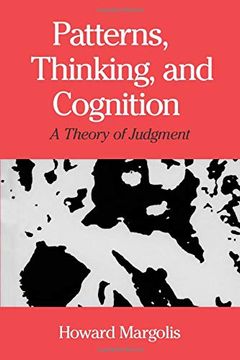Compartir
Patterns, Thinking, and Cognition: A Theory of Judgment (en Inglés)
Howard Margolis (Autor)
·
University Of Chicago Press
· Tapa Blanda
Patterns, Thinking, and Cognition: A Theory of Judgment (en Inglés) - Howard Margolis
$ 38.95
$ 52.86
Ahorras: $ 13.91
Elige la lista en la que quieres agregar tu producto o crea una nueva lista
✓ Producto agregado correctamente a la lista de deseos.
Ir a Mis ListasSe enviará desde nuestra bodega entre el
Lunes 06 de Mayo y el
Martes 07 de Mayo.
Lo recibirás en cualquier lugar de Estados Unidos entre 1 y 3 días hábiles luego del envío.
Reseña del libro "Patterns, Thinking, and Cognition: A Theory of Judgment (en Inglés)"
What happens when we think? How do people make judgments? While different theories abound—and are heatedly debated—most are based on an algorithmic model of how the brain works. Howard Margolis builds a fascinating case for a theory that thinking is based on recognizing patterns and that this process is intrinsically a-logical. Margolis gives a Darwinian account of how pattern recognition evolved to reach human cognitive abilities. Illusions of judgment—standard anomalies where people consistently misjudge or misperceive what is logically implied or really present—are often used in cognitive science to explore the workings of the cognitive process. The explanations given for these anomalous results have generally explained only the anomaly under study and nothing more. Margolis provides a provocative and systematic analysis of these illusions, which explains why such anomalies exist and recur. Offering empirical applications of his theory, Margolis turns to historical cases to show how an individual's cognitive repertoire—the available cognitive patterns and their relation to cues—changes or resists changes over time. Here he focuses on the change in worldview occasioned by the Copernican discovery: not only how an individual might come to see things in a radically new way, but how it is possible for that new view to spread and become the dominant one. A reanalysis of the trial of Galileo focuses on social cognition and its interactions with politics. In challenging the prevailing paradigm for understanding how the human mind works, Patterns, Thinking, and Cognition is certain to stimulate fruitful debate.
- 0% (0)
- 0% (0)
- 0% (0)
- 0% (0)
- 0% (0)
Todos los libros de nuestro catálogo son Originales.
El libro está escrito en Inglés.
La encuadernación de esta edición es Tapa Blanda.
✓ Producto agregado correctamente al carro, Ir a Pagar.

